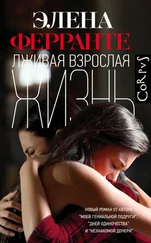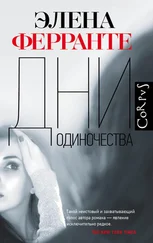“Please, don’t tell Papa.”
She stared at me for a long moment, then replied in dialect, mean, incomprehensibly mocking:
“Papa? You think Papa gives a fuck about the ankles of Mariano and Nella under the table?”
7.
The time passed very slowly, I kept checking the clock. Ida was having fun with Giuliana, Tonino seemed completely at ease with Angela, I felt like a failure, like a cake made with the wrong ingredients. What had I done. What would happen now. Corrado returned with the water for Vittoria, in no hurry, idly. I found him boring, but at that moment I felt lost and hoped that he would pay even a little attention to me. He didn’t, in fact, he didn’t even wait for my aunt to finish drinking, he vanished among the parishioners. Vittoria followed him with her gaze, she was forgetting that I was there next to her waiting for explanations, advice. Was it possible that she had judged insignificant even that grievous fact I had told her? I watched her closely, she was gruffly demanding from a fat woman in her fifties an excessive amount for a pair of sunglasses, but she didn’t lose sight of Corrado: there was something about his behavior that—it appeared to me—seemed to her more serious than what I had revealed to her. Look at him, she said to me, he’s too sociable, just like his father. And suddenly she called him: Currà. And when he didn’t hear or pretended not to, she abandoned the fat woman whose glasses she was wrapping and, clutching the scissors she used to cut the ribbon for tying up packages and grabbing me with her left hand, dragged me with her through the courtyard.
Corrado was talking to three or four young men, one of whom was tall and thin and had buck teeth that gave the impression that he was laughing even when there was nothing to laugh at. My aunt, apparently calm, ordered her godson—today that seems to me the right definition for the three children—to return immediately to the stand. He answered playfully: two minutes and I’ll be there, while the boy with the buck teeth seemed to laugh. My aunt turned to him abruptly and said she would cut off his pesce —she used precisely that dialect word, pesce , fish , in a calm voice, brandishing the scissors—if he kept laughing. But the kid didn’t seem to want to stop, and I sensed all Vittoria’s fury, on the verge of exploding. I was worried, she didn’t seem to understand that his buck teeth prevented him from keeping his mouth closed, she didn’t seem to understand that he would laugh even during an earthquake. In fact, suddenly she yelled at him:
“You’re laughing, Rosà, you dare to laugh?”
“No.”
“Yes, you’re laughing because you think your father will protect you, but you’re wrong, no one protects you from me. You leave Corrado alone, understand?”
“Yes.”
“No, you don’t understand, you’re convinced I can’t do anything to you, but watch out.”
She pointed the scissors at him and, right before my eyes, and in front of some parishioners who were starting to wonder about that unexpectedly loud tone of voice, pricked the boy in one leg, so that he jumped back, the terrified astonishment of his eyes spoiling the fixed mask of his laugh.
My aunt pressed him, threatened to prick him again.
“Get it now, Rosà,” she said, “or do I have to keep going? I don’t give a fuck if you’re the son of attorney Sargente.”
The young man, whose name was Rosario, and who was evidently the son of that lawyer I didn’t know, raised one hand in a sign of surrender, retreated, went off with his friends.
Corrado, indignant, started to follow them, but Vittoria stood in front of him with the scissors saying:
“Don’t you move, because if you make me mad I’ll use these with you, too.”
I pulled her by the arm.
“That guy,” I said, frightened, “can’t close his mouth.”
“He dared to laugh in my face,” Vittoria replied, panting, “and no one laughs in my face.”
“He was laughing but not on purpose.”
“On purpose or not, he was laughing.”
Corrado scowled, he said:
“Forget it, Giannì, it’s pointless to talk to her.”
But my aunt gave a cry, she yelled at him, gasping:
“You shut up, I don’t want to hear a word.”
She was clutching the scissors, I realized that she was having a hard time controlling herself. Her capacity for affection must long ago have been used up, probably with the death of Enzo, but her capacity for hatred—it seemed to me—had no limit. I had just seen how she behaved with poor Rosario Sargente, and she would have been capable of hurting even Corrado: imagine then what she would do to my mother and especially my father, now that I had told her about Mariano. The idea of it made me feel like crying again. I’d been reckless, the words had spilled out unintentionally. Or maybe not, maybe in some part of me I had long ago decided to tell Vittoria what I had seen, I had already decided when I gave in to the pressure of my friends and arranged that meeting. I could no longer be innocent, behind my thoughts there were other thoughts, childhood was over. I strained, and yet innocence eluded me, the tears that I felt continuously in my eyes hardly proved that I wasn’t guilty. Luckily, Don Giacomo arrived, soothing, and that kept me from crying. Come, come, he said to Corrado, putting an arm around his shoulders, let’s not make Vittoria mad, she’s not well today, help her carry the pastries. My aunt sighed bitterly, placed the scissors on the edge of one of the stands, glanced at the street beyond the courtyard, perhaps to see if Rosario and the others were still there, then said firmly: I don’t want help, and disappeared through the doorway that led to the church.
8.
She returned soon afterward carrying two large trays of almond pastries, each with blue and pink icing stripes and a small sugared almond on top. The parishioners fought over them; eating even one was enough to disgust me, my stomach was contracted, my heart pounding in my throat. Don Giacomo brought over an accordion, holding it in both arms as if it were a red-and-white child. I thought he knew how to play, but he delivered it a little awkwardly to Vittoria, who took it without protest—was it the same one I’d seen in the corner at her house?—sat down on a chair, sullenly, and played with her eyes closed, grimacing.
Angela came up behind me and said cheerfully: your aunt—you see her—is really ugly. At that moment it was very true: Vittoria contorted her face like a devil while she played, and even though she was good and the parishioners applauded, she made a repellent spectacle. She tossed her shoulders, curled her lips, wrinkled her forehead, stretched her trunk backward so far that it seemed to be much longer than her legs, which were spread indecorously. It was a blessing when a white-haired man took over and began to play. But my aunt still wouldn’t calm down, she went to Tonino, grabbed him by one arm and forced him to dance, taking him away from Angela. Now she seemed happy, but maybe it was only the tremendous ferocity she had in her body and wanted to vent by dancing. Seeing her, others danced, too, old and young, even Don Giacomo. I closed my eyes to cancel out everything. I felt abandoned, and for the first time in my life, against everything my parents had taught me, I tried to pray. God, I said, God, please, if you truly can do everything, don’t let my aunt say anything to my father, and I closed my eyes tight, as if squeezing my eyelids could concentrate in the prayer enough force to hurl it up to the Lord in the kingdom of Heaven. Afterward, I prayed that my aunt would stop dancing and return us to Costanza on time, a prayer that was miraculously answered. To my surprise, despite pastries, music, songs, interminable dances, we departed in time to leave behind the hazy Industrial Zone and arrive punctually on the Vomero, on Via Cimarosa, at Angela and Ida’s house. Costanza, too, was punctual, she appeared in a dress even more beautiful than the one of the morning. Vittoria got out of the 500, delivered Angela and Ida, and praised her again, again admired all her things. She admired the dress, the hairstyle, the makeup, the earrings, the necklace, the bracelet, which she touched, almost caressed, asking me: do you like it, Giannì?
Читать дальше
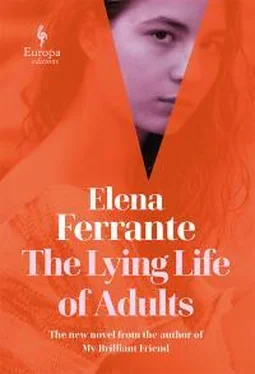
![Элена Ферранте - История о пропавшем ребенке [litres]](/books/32091/elena-ferrante-istoriya-o-propavshem-rebenke-litres-thumb.webp)
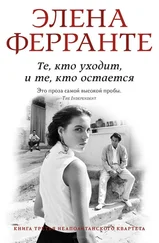
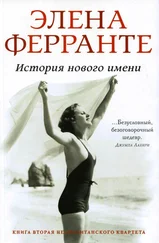
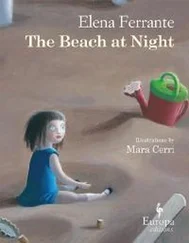
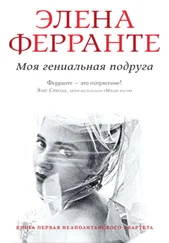
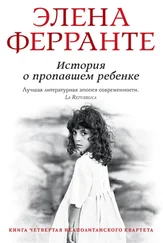
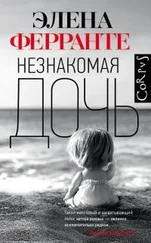
![Элена Ферранте - Дни одиночества [litres]](/books/404671/elena-ferrante-dni-odinochestva-litres-thumb.webp)

